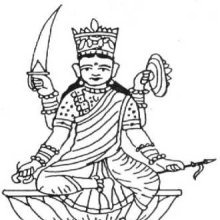Anantamati, Ananta-mati, Anantamatī: 8 definitions
Introduction:
Anantamati means something in Jainism, Prakrit, Hinduism, Sanskrit. If you want to know the exact meaning, history, etymology or English translation of this term then check out the descriptions on this page. Add your comment or reference to a book if you want to contribute to this summary article.
Images (photo gallery)
In Jainism
General definition (in Jainism)
Source: archive.org: The Jaina IconographyAnantamatī (अनन्तमती) or Aṃkuśā is the name of the Yakṣa accompanying Anantanātha: the fourteenth of twenty-four Tīrthaṃkaras or Jinas, commonly depicted in Jaina iconography.—The symbolic mark which distinguishes Anantanātha from all other Tīrthaṃkaras is the hawk according to Śvetāmbaras and the bear according to the Digambaras. The Yakṣa and Yakṣiṇī, the goblins, serving him are named Pātāla and Anantamatī (Śvetāmbara Aṃkuśā) respectively. The Chowri-waver, in his case, was king Puruṣottama-Vāsudeva by name. The tree associated with his enlightenment is Aśvattha (Ficus religioso).
Aṃkuśā of the Śvetāmbaras is to be canonically sculpturedas seated on a lotus, and having four hands with a sword, noose, spear and goad. The Digambaras to whom this Yakṣiṇī is known as Anantamatī describe her as being carried by a swan and as holding in her hands a bow, arrow, fruit and Varada. The name “Aṃkuśā” appears to be derived from the Aṃkuśā or goad, which the Yakṣiṇī carries. In the same name, we find a Vidyādevī who also bears a goad. The name Anantamatī originates very evidently from Anantanātha, the Jina and master, whom the Yakṣiṇī waits upon. Brahmā’s wife is Sarasvatī; here the origin of the swan as a vehicle might be due to this connection.
Source: archive.org: TrisastisalakapurusacaritraAnantamati (अनन्तमति) is the wife of king Mahendra from Śrīnandanapura, according to chapter 5.2 [śāntinātha-caritra] of Hemacandra’s 11th century Triṣaṣṭiśalākāpuruṣacaritra: an ancient Sanskrit epic poem narrating the history and legends of sixty-three illustrious persons in Jainism.
Accordingly, as a Goddess said to Sumati:—“[...] Young lady, Dhanaśrī, wake up! Wake up! Remember your former birth. In the half of Puṣkaravaradvīpa, in the middle section of East Bharata, there is an extensive rich city, Śrīnandanapura. In it there was a king, named Mahendra, like Mahendra (Indra), always zealous day and night in protecting people seeking protection. The king’s chief-queen, dearer than life, was named Anantamati, the receptacle of infinite virtues.. [...]”.

Jainism is an Indian religion of Dharma whose doctrine revolves around harmlessness (ahimsa) towards every living being. The two major branches (Digambara and Svetambara) of Jainism stimulate self-control (or, shramana, ‘self-reliance’) and spiritual development through a path of peace for the soul to progess to the ultimate goal.
Languages of India and abroad
Sanskrit dictionary
Source: DDSA: The practical Sanskrit-English dictionaryAnantamati (अनन्तमति).—Name of a Bodhisattva.
Derivable forms: anantamatiḥ (अनन्तमतिः).
Anantamati is a Sanskrit compound consisting of the terms ananta and mati (मति).
Source: Cologne Digital Sanskrit Dictionaries: Edgerton Buddhist Hybrid Sanskrit DictionaryAnantamati (अनन्तमति).—(1) name of one of the sons of the Buddha Candrasūryapradīpa: Saddharmapuṇḍarīka 19.3; (2) name of a Bodhisattva: Rāṣṭrapālaparipṛcchā 1.12.
Source: Cologne Digital Sanskrit Dictionaries: Monier-Williams Sanskrit-English DictionaryAnantamati (अनन्तमति):—[=an-anta-mati] [from an-anta] m. Name of a Bodhisattva.
Source: Cologne Digital Sanskrit Dictionaries: Goldstücker Sanskrit-English DictionaryAnantamati (अनन्तमति):—[bahuvrihi compound] m.
(-tiḥ) The proper name of a Bodhi-sattva or Bauddha saint, the son of the Tathāgata Chandrasūryapradīpa. E. ananta and mati.
[Sanskrit to German]
Sanskrit, also spelled संस्कृतम् (saṃskṛtam), is an ancient language of India commonly seen as the grandmother of the Indo-European language family (even English!). Closely allied with Prakrit and Pali, Sanskrit is more exhaustive in both grammar and terms and has the most extensive collection of literature in the world, greatly surpassing its sister-languages Greek and Latin.
See also (Relevant definitions)
Partial matches: Ananta, Mati.
Starts with: Anantamatika.
Full-text: Ankusha, Purushottama, Shrinandanapura, Giriparvata, Dhanashri, Patala, Anantanatha.
Relevant text
Search found 7 books and stories containing Anantamati, Ananta-mati, Anantamatī, Ananta-matī; (plurals include: Anantamatis, matis, Anantamatīs, matīs). You can also click to the full overview containing English textual excerpts. Below are direct links for the most relevant articles:
Jain Remains of Ancient Bengal (by Shubha Majumder)
The twenty-four Tīrthaṅkaras and their Yakṣas and Yakṣiṇīs < [Chapter 6 - Iconographic Study of Jaina Sculptural Remains]
Jainism in Odisha (Orissa) (by Ashis Ranjan Sahoo)
Iconography of Jain Gods and Goddess < [Chapter 6]
Iconography of Sasanadevis < [Chapter 6]
Trishashti Shalaka Purusha Caritra (by Helen M. Johnson)
Part 6: Story of Sumati < [Chapter II - Sixth incarnation as Aparājita]
A study of the philosophy of Jainism (by Deepa Baruah)
Chapter I.c - The lives of the Tīrthaṅkaras < [Chapter I - Introduction]
Bodhisattvacharyavatara (by Andreas Kretschmar)
Text Section 39 < [Khenpo Chöga’s Oral Explanations]
